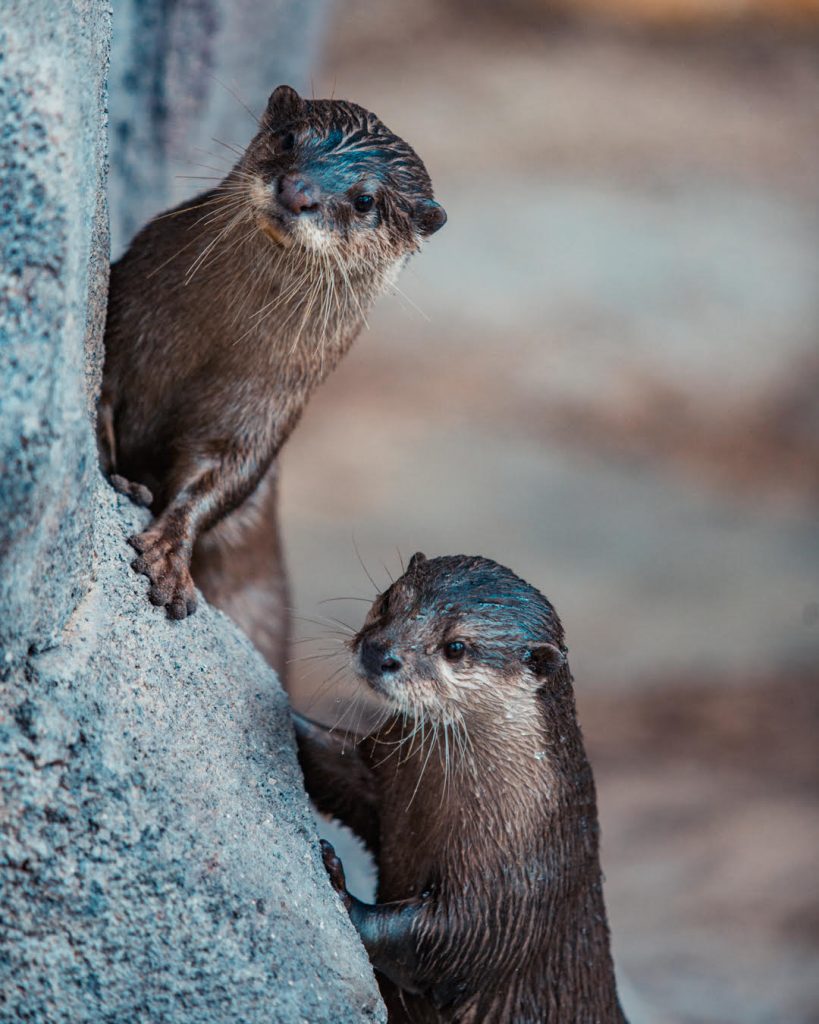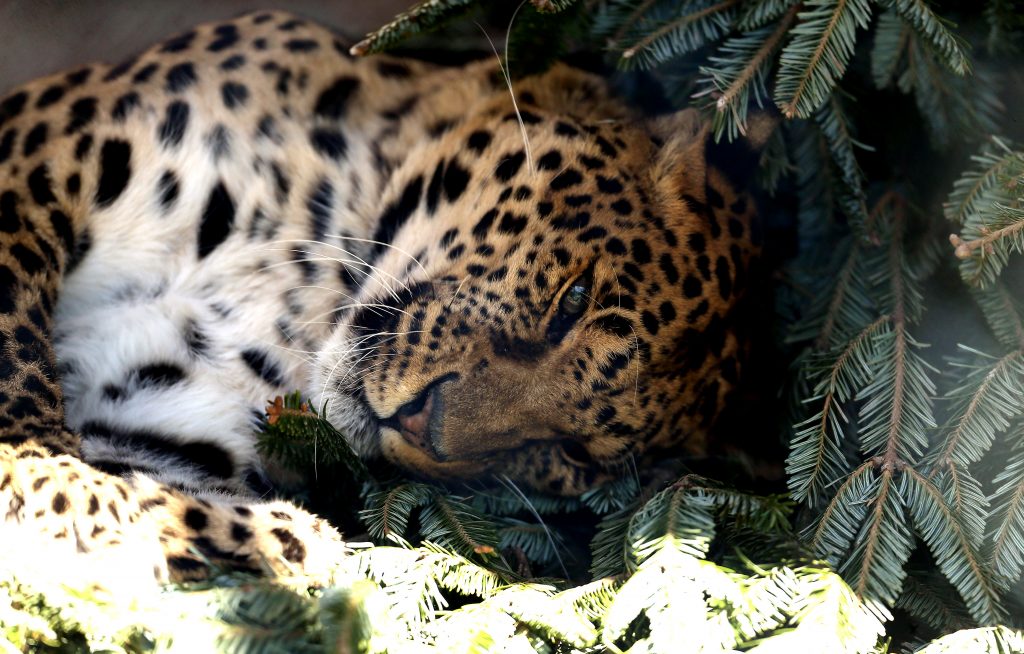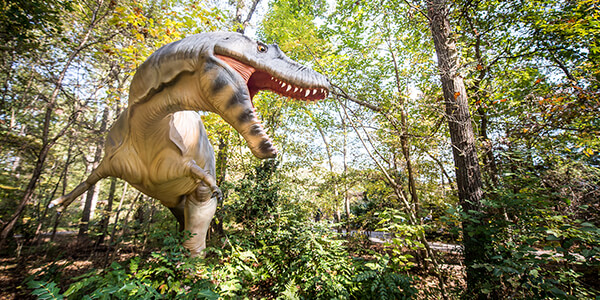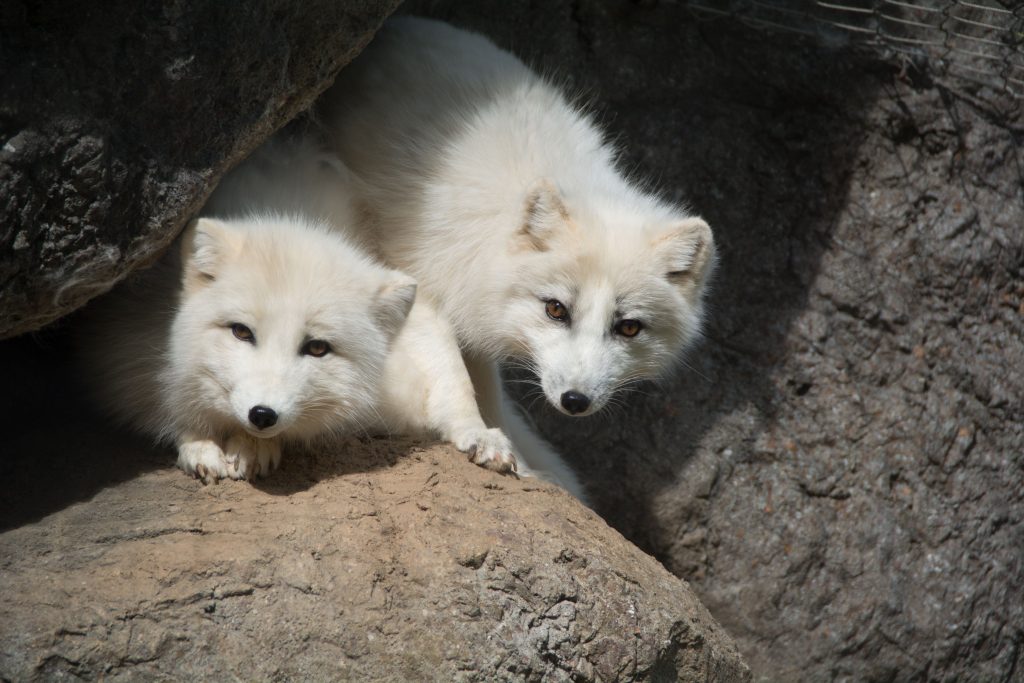More than a dozen places in North Carolina where you can observe protected wild animals.
by Cady Smith and Emily Clemente

As we approach spring with many of us yearning for a change of scenery, head to these sanctuaries, science centers, and more where you can observe wild and beautiful animals here in North Carolina in their natural habitat. From lemurs to birds, to tigers and more, you can find wildlife destinations well worth the drive along the coast, the mountains, and the Piedmont region. With the ever-changing restrictions due to the pandemic, please check individual websites for hours and access information.
Alligator River National Wildlife Refuge
Alligator River National Wildlife Refuge, a unit of the National Wildlife Refuge System, is home to many species of wildlife, including migratory birds, American alligators, and endangered or threatened species like the red wolf. The refuge offers guided tours and scheduled programs so you can experience the wonders of wild animals and their habitats for yourself. Walk along the series of nature trails, take part in a wildlife viewing class, or sit in on an environmental education session.
Milltail Road, East Lake; fws.gov/refuge/alligator_river
The Animal Park at the Conservators Center
Come visit the Animal Park at the Conservators Center and see all 70 animals from a whole range of species around the world. Join in on one of their many different tour experiences offered, from their Adventure tour, to their Twilight Tour, to even their Treat Safari where you can watch tour guides feed the animals their favorite treats. Discover new things about wild animals you might already be familiar with, including the bengal cat, lion, and tiger, or see animals you’ve never heard of like the fennec fox, dingo, caracal, and kinkajou. The center is open for public tours Thursday through Sunday.
676 East Hughes Mill Road, Burlington; animalparknc.org
Carolina Raptor Center
Visit the Carolina Raptor Center, a sanctuary and rescue facility for over 30 species of birds of prey. Observe hawks, eagles, owls, and other birds along the walking trail, or search for one of their various events and activities that they offer throughout the year like Migratory Bird Day and International Vulture Awareness Day. Some of their trail exhibits include the Eagle Aviary, Owl Forest, A Day in the Life of a Raptor Hospital, and Vulture Culture. The trail is currently closed due to COVID-19, but will reopen on February 3rd.
60000 Sample Road, Huntersville; carolinaraptorcenter.org

Carolina Tiger Rescue
Take a tour of the Carolina Tiger Rescue, a center that works to rescue and protect wild cats and educate the public through tours and educational programs. Learn all about their ten species of animals, including lions, tigers, leopards, and ocelots, the problems they face in the wild, and some of the challenges of keeping them in captivity. They’re still offering public, private and twilight tours during COVID-19.
1940 Hanks Chapel Road, Pittsboro; carolinatigerrescue.org

Duke Lemur Center
Did you know that lemurs are the most endangered mammals on the planet? The Duke Lemur Center is working to save these creatures and prevent them from becoming extinct. The center studies, cares for, and protects more than 200 lemurs from 14 different species. The center is temporarily closed to visitors due to COVID-19, but is now offering virtual tours and other programs like private zoom chats with lemur experts.
3705 Erwin Road, Durham; lemur.duke.edu
Greensboro Science Center
Want to visit museums? Aquariums? Zoos? How about all three at the Greensboro Science Center, where you can observe and learn about both land and aquatic species, see an Adventure Theater show or even a 3D OmniSphere film. Check out everything from lions and monkeys to their otters and penguins while also visiting their information center to learn about the center’s mission to protect and conserve both wild species and the habitats they call home. Reservations are required during the pandemic.
4301 Lawndale Drive, Greensboro; greensboroscience.org

Museum of Life and Science
The Museum of Life and Science hosts 84 acres of exploration and fun. Observe butterflies in the Magic Wings Butterfly House–one of the largest butterfly houses on the East Coast–or check out any of their 60 species of live animals cared for onsite. There are also outdoor exhibits that act as safe havens for rescued animals, like red wolves and black bears. Most of their popular exhibits are open to visitors, but reserving tickets beforehand is required.
433 West Murray Avenue, Durham; lifeandscience.org

North Carolina Aquarium at Fort Fisher
This branch of the NC Aquarium is open during COVID-19 and just unveiled their “Otters on the Edge” exhibit. The approximately 3,000-square-foot space now houses an otter family of four and features streams, waterfalls, a log slide and an enclosed pool. Visitors can watch the charming animals through five viewing windows and there’s a crawl space open for children to explore, perfect for parents wanting to snap a photo. Reservations are required to visit the aquarium due to limited capacity.
900 Loggerhead Road, Kure Beach; ncaquariums.com/fort-fisher
North Carolina Aquarium at Roanoke Island
The North Carolina Aquarium at Roanoke Island is one of four locations and is one of the Outer Banks’ major attractions. Take a self-guided tour and explore all of the exhibits that the facility has to offer like the largest group of sharks in North Carolina. See ocean wildlife like Loggerhead sea turtles in the Sea Turtle Assistance and Rehabilitation (STAR) Center or pet a stingray and learn about conservation efforts and different marine habitats. The aquarium is currently open, but reservations are required.
374 Airport Road, Manteo; ncaquariums.com/pine-knoll-shores

North Carolina Museum of Natural Sciences
While you won’t find quite as many furry friends here, you’ll be sure to find some other incredible animals such as insects, reptiles, amphibians, arachnids. Check out the butterfly room at the North Carolina Museum of Natural Science or visit some of their exhibits where you can find snakes, frogs, and more. Or, take a little trip back in time and learn about dinosaurs and other amazing creatures that once roamed our earth. The museum remains open to visitors during COVID-19.
11 West Jones Street, Raleigh; naturalsciences.org

North Carolina Zoo
Located just outside of Asheboro, the North Carolina Zoo is the world’s largest natural habitat zoo. It protects and cares for both animal and plant wildlife species from across North America, Asia, and Africa along with those from desert and arctic climates. View African elephants, Arctic foxes, and North American river otters up close in their natural settings and learn about the zoo’s efforts to conserve each species both regionally and internationally for more than 20 years. The zoo is opened with limited capacity during the pandemic, but tickets must be purchased in advance.
4401 Zoo Parkway, Asheboro, N.C; nczoo.org
Sylvan Heights Bird Park
You know what’s not for the birds? How about a place where you can not only observe and interact with bird species from all over the world, but where you can also learn about the types of birds from here in North Carolina and the ecosystems that they thrive in? The Sylvan Heights Bird Park doubles as a conservatory for waterfowl and wetlands and a center for avicultural training and research. Come by and visit for a tour in Scotland Neck, N.C. Nearly all of the park’s exhibits are currently open to the public.
500 Sylvan Heights Park Way, Scotland Neck; shwpark.com
Western North Carolina Nature Center
Home to 60 species of wild and domestic animals and hundreds of species of plants, the Western North Carolina Nature Center features animals like the American black bear, Angora goat, Great horned owl, and red panda. All of the wildlife are representative of the unique bioregion of the Southern Appalachian Mountains. Explore the center, or sign up for one of the activities and events offered, including their Wild Walk: Behind the Scenes tour and Junior Wild Walk: Behind the Scenes for Kids. Indoor programming is currently closed, but outdoor areas are open and reservations aren’t required to visit.
75 Gashes Creek Road, Asheville; wildwnc.org
